鲁教版 五四制 六年级下册 英语教材全解
新鲁教版六年级英语(五四制)下册 Unit 1 Section A-3 课件

How to spell?
seventeenth twentieth twenty-first twenty-third twenty-fourth twenty-eighth thirtieth thirty-first 17th 20th 21st 23rd 24th 28th 30th 31st
Fourteenth fifteenth sixteenth seventeenth
eighteenth nineteenth twentieth twenty-first twenty-second twenty-third twenty-fourth
twenty-fifth twenty-sixth twenty-seventh twenty-eighth twenty-ninth thirtieth thirty-first
July 3rd February 12th
July the third February the twelfth
is the first month of the year. second
third
fourth fifth sixth
is the seventh month of the year.
When is your birthday?
My birthday is on……
When is your father’s birthday?
His birthday is on……
first second third fourth fifth sixth seventh
Eighth ninth tenth eleventh twelfth thirteenth
Words and expressions
鲁教版五四制英语六年级下册Unit6Don’teatinclass讲解与练习
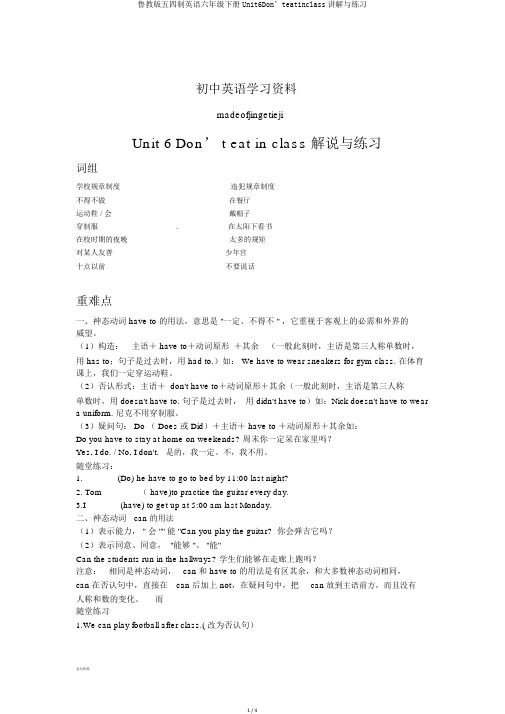
初中英语学习资料madeofjingetiejiUnit 6 Don’ t eat in class解说与练习词组学校规章制度_____________违犯规章制度____________不得不做 ____________在餐厅____________运动鞋 / 会 ____________戴帽子____________穿制服 ____________.在太阳下看书____________在校时期的夜晚____________太多的规矩____________对某人友善 ____________少年宫____________十点以前 ____________不要说话____________重难点一、神态动词 have to 的用法,意思是 "一定、不得不 " ,它重视于客观上的必需和外界的威望。
(1)构造:主语+ have to+动词原形+其余(一般此刻时,主语是第三人称单数时,用 has to;句子是过去时,用 had to.)如: We have to wear sneakers for gym class. 在体育课上,我们一定穿运动鞋。
(2)否认形式:主语+ don't have to+动词原形+其余(一般此刻时,主语是第三人称单数时,用 doesn't have to. 句子是过去时,用 didn't have to)如:Nick doesn't have to wear a uniform. 尼克不用穿制服。
(3)疑问句: Do ( Does 或 Did)+主语+ have to +动词原形+其余如:Do you have to stay at home on weekends? 周末你一定呆在家里吗?Yes, I do. / No, I don't.是的,我一定。
不,我不用。
随堂练习:1._______(Do) he have to go to bed by 11:00 last night?2.Tom _______ ( have)to practice the guitar every day.3.I _______(have) to get up at 5:00 am last Monday.二、神态动词can 的用法(1)表示能力, " 会 "" 能 "Can you play the guitar? 你会弹吉它吗?(2)表示同意、同意, "能够 "、 "能"Can the students run in the hallways? 学生们能够在走廊上跑吗?注意:相同是神态动词,can 和 have to 的用法是有区其余,和大多数神态动词相同,can 在否认句中,直接在can 后加上 not,在疑问句中,把can 放到主语前方,而且没有人称和数的变化。
鲁教版英语(五四制)六年级下册_Unit5_名师教材解读
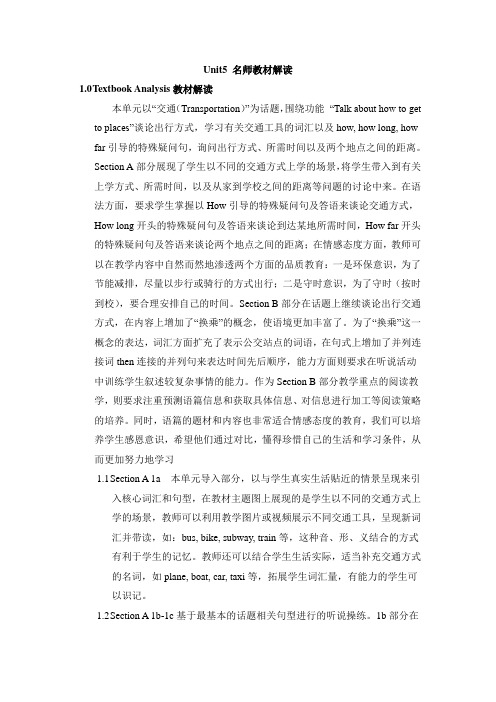
Unit5 名师教材解读1.0T extbook Analysis教材解读本单元以“交通(Transportation)”为话题,围绕功能“Talk about how to get to places”谈论出行方式,学习有关交通工具的词汇以及how, how long, how far引导的特殊疑问句,询问出行方式、所需时间以及两个地点之间的距离。
Section A部分展现了学生以不同的交通方式上学的场景,将学生带入到有关上学方式、所需时间,以及从家到学校之间的距离等问题的讨论中来。
在语法方面,要求学生掌握以How引导的特殊疑问句及答语来谈论交通方式,How long开头的特殊疑问句及答语来谈论到达某地所需时间,How far开头的特殊疑问句及答语来谈论两个地点之间的距离;在情感态度方面,教师可以在教学内容中自然而然地渗透两个方面的品质教育:一是环保意识,为了节能减排,尽量以步行或骑行的方式出行;二是守时意识,为了守时(按时到校),要合理安排自己的时间。
Section B部分在话题上继续谈论出行交通方式,在内容上增加了“换乘”的概念,使语境更加丰富了。
为了“换乘”这一概念的表达,词汇方面扩充了表示公交站点的词语,在句式上增加了并列连接词then连接的并列句来表达时间先后顺序,能力方面则要求在听说活动中训练学生叙述较复杂事情的能力。
作为Section B部分教学重点的阅读教学,则要求注重预测语篇信息和获取具体信息、对信息进行加工等阅读策略的培养。
同时,语篇的题材和内容也非常适合情感态度的教育,我们可以培养学生感恩意识,希望他们通过对比,懂得珍惜自己的生活和学习条件,从而更加努力地学习1.1S ection A 1a 本单元导入部分,以与学生真实生活贴近的情景呈现来引入核心词汇和句型,在教材主题图上展现的是学生以不同的交通方式上学的场景,教师可以利用教学图片或视频展示不同交通工具,呈现新词汇并带读,如:bus, bike, subway, train等,这种音、形、义结合的方式有利于学生的记忆。
新鲁教版六年级英语(五四制)下册 Unit 2 Section A-3 课件

鲁教版(五四学制)六年级英语下册
Unit 1 When is your birthday? Unit 2 My favorite subject is science. Unit 3 Can you play the guitar? Unit 4 What time do you go to school? Unit 5 How do you get to school? Unit 6 Don't eat in class! Unit 7 Why do you like pandas? Unit 8 I'm watching TV. Unit 9 It's raining! Unit 10 Is there a post office near here?
Try to make sentences by using: Who, Why, When, What.
Let’s see who is the best!
Grammar Focus
Questions Answers
What’s your favorite subject?
What’s his favorite subject? What’s her favorite subject? Why does Bob like history? Why do Frank and Bob like P.E.? Who’s your music teacher? When is your geography class?
3a Fill in the blanks with what, who or why.
1. A: ______ Why do you like history? B: Because it’s interesting. 2. A: ______ Who likes math? B: Eric does. 3. A: ______ What is your favorite subject? B: My favorite subject is P.E. 4. A: ______ Who is your science teacher? B: My science teacher is Mr. Chen. 5. A: ______ Why do you like art? B: Because it’s fun.
2020鲁教版六年级英语下册(五四学制)课件【全册】
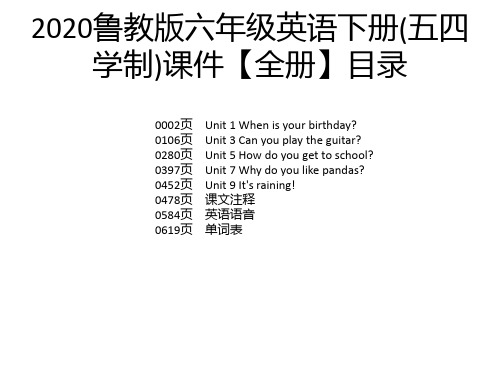
Unit 1 When is your birthday?
2020鲁教版六年级英语下册(五四 学制)课件【全册】
Unit 2 My favorite subject is science.
2020鲁教版六年级英语下册(五四 学制)课件【全册】
Unit 5 How do you get to school?
2020鲁教版六年级英语下册(五四 学制)课件【全册】
2020鲁教版六年级英语下册(五四 学制)课件【全册】
Unit 10 Is there a post office near hear?
2020鲁教版六年级英语下册(五四 学制)课件【全册】
课文注释
2020鲁教版六年级英语下册(五四 学制)课件【全册】
英语语法
2020鲁教版六年级英语下册(五四 学制)课件【全册】
2020鲁教版六年级英语下册(五四 学制;m watching TV.
2020鲁教版六年级英语下册(五四 学制)课件【全册】
Unit 9 It's raining!
Unit 6 Don't eat in class.
2020鲁教版六年级英语下册(五四 学制)课件【全册】
Unit 7 Why do you like pandas?
2020鲁教版六年级英语下册(五四 学制)课件【全册】
Unit 3 Can you play the guitar?
2020鲁教版六年级英语下册(五四 学制)课件【全册】
Unit 4 What time do you go to school?
听力原文
2020鲁教版六年级英语下册(五四 学制)课件【全册】
英语语音
2020鲁教版六年级英语下册(五四 学制)课件【全册】
鲁教版六年级英语下册(五四学制)全册课件【完整版】
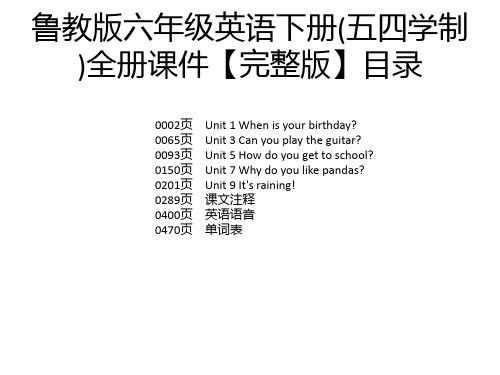
Unit 5 How do you get to school?
鲁教版六年级英语下册(五四学制) 全册课件【完整版】
Unit 6 Don't eat in class.
鲁教版六年级英语下册(五四学制) 全册课件【完整版】
Unit 7 Why do you like pandas?
鲁教版六年级英语下册(五四学制) 全册课件【完整版】
Unit 8 I'm watching TV.
鲁教版六年级英语下册(五四学制) 全册课件【完整版】
Unit 9 It's raining!
鲁教版六年级英语下册(五四学制) 全册课件【完整版】
Unit 3 Can you play the guitar?
鲁教版六年级英语下册(五四学制) 全册课件【完整版】
Unit 4 What time do you go to school?
鲁教版六年级英语下册(五四学制) 全册课件【完整版】
Unit 1 When is your birthday?
鲁教版六年级英语下册(五四学制) 全册课件【完பைடு நூலகம்版】
Unit 2 My favorite subject is science.
鲁教版六年级英语下册(五四学制) 全册课件【完整版】
鲁教版六年级英语下册(五四学制 )全册课件【完整版】目录
0002页 0065页 0093页 0150页 0201页 0289页 0400页 0470页
Unit 1 When is your birthday? Unit 3 Can you play the guitar? Unit 5 How do you get to school? Unit 7 Why do you like pandas? Unit 9 It's raining! 课文注释 英语语音 单词表
新鲁教版英语(五四制)六年级下册课件:Unit 7 Why do
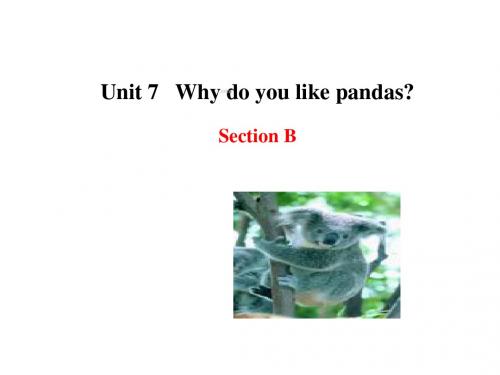
Section B
Lead in
A: What animals do you like zxxkw ? B: I like … A: Why do you like…? B: Because they’re very cute /smart /kind of interesting.
1c Listen again. Whatzxxkww ords do they use to describe the animals? Fill in the chart.
Animals elephants pandas
Mary’s words
Tony’s words
PAIRWORK
zxxkw
smart and friendly. She _l_iv_e_s_ in Blackwood Zoo.
zxxkw
Task:
Tell us your favorite animal.
_________________________________________________ _________________________________________________ _________________________________________________ _________________________________________________
Presentation
1a Match the descriptzixxokw n words with the animals.
1. smart__d_ 3. beautiful __b_ 5. lazy_f__ 7. small___f_ 2. friendly _d__ 4. cute __f_ 6. scary _a_, _c 8. shy_e__
鲁教版 五四制 六年级下册 英语教材全解

鲁教版五四制六年级下册英语教材全解(本检测题满分:100分;时间:60分钟)一、听力部分(满分20分)Ⅰ.听句子.选择与句子内容相符的图片.每个句子读一遍.(每小题1分.满分5分)A. B. C. D. E.1._________2._________3._________4._________5._________Ⅱ.听对话及问题.根据对话内容选择正确的答语.每段对话读一遍.(每小题1分.满分5分)6. A. Her bike is los t. B. There is something wrong with her bike.C. She doesn’t like riding.7. A. He takes a bus. B. He rides a bike.C. He walks to school.8. A. Thirty minutes. B. An hour.C. An hour and thirty minutes.9. A. By ship. B. By air. C. By bike.10. A. Less than two miles. B. More than two miles.C. Two miles.Ⅲ.听对话.根据对话内容选择正确的答语.对话读两遍.(每小题1分.满分5分)11. How does Mr Li go to work?A. He goes to work by bus.B. He goes to work by boat.C. He goes to work on foot.12. How does Mr Li’s wife go to work?A. She goes to work by car.B. She goes to work by bus.C. She goes to work by boat.13. How does Mr Smith go to work?A. He goes to work by car.B. He goes to work by subway.C. He goes to work by boat.14. How does Mr Smith’s brother go to w ork?A. He goes to work by taxi.B. He goes to work by subway.C. He goes to work by motorbike.15. How does Tom go to work?A. He goes to work by bike.B. He goes to work by subway.C. He walks to work.Ⅳ.听短文.根据短文内容填空.短文读两遍.(每小题1分.满分5分)Mr. Brown has a car. In the morning he 16 his children to school in his car. Then he drives to work. Mr. Brown and his children do not have 17 at home but Mrs. Brown does. She does not go to work. She stays at home. She does some shopping and cleaning in the morning. In the afternoon she 18 goes to see some of her friends, has tea and talks a lot with them. Then she cooks 19 20二、笔试部分(满分80分)Ⅰ.单项填空(每小题1分.满分10分)21. —How does your sister go to school?— .A. Once a dayB. Two milesC. By busD. Twentyminutes22. When do you leave school?A. toB. inC. forD. at23. It’s good exercise every day.A. takeB. to takeC. takingD. takes24. —Kate, do you know it is from here to the gym?—About twenty minutes’ walk.A. how longB. how farC. how soonD. how often25. The old man often gets there at six by bike.A. toB. forC. /D. on26. What do you think the teacher?A. aboutB. ofC. onD. for27. Does it five minutes from here to your home?A. spendB. takeC. takesD. pay28. I don’t know .A. where is itB. where it isC. where be itD. it is where29. It takes thirty minutes to get to school by bike.A. IB. myC. meD. mine30. Why not g o to the library foot or bike? It’s not too far from here.A. to; onB. on; byC. in; onD. by; byⅡ.完形填空(每小题1分.满分10分)Tom 31 near the sea. Their house is not very high, but it is beautiful. There 32 big trees and a small garden in front 33 their house. They plant flowers in the garden. Some are red, some are white 34 some are blue. Tom and his family love 35 garden very much.36 Tom and his sister go to school 37 38 some shopping at the Shopping Centre, and sometimes help their dad in the garden. At weekends, they often take some photos by the sea. 39 summer, they often go swimming 40 their parents.31. A. lives B. lived C. living D. liveing32. A. are B. is C. was D. be33. A. to B. for C. at D. of34. A. but B. or C. at D. and35. A. they B. them C. their D. theirs36. A. All B. Both C. Some D. Two37. A. on B. by C. take D. sit38. A. do B. doing C. does D. did39. A. In B. On C. At D. To40. A. and B. for C. of D. withⅢ.阅读理解(每小题2分.满分20分)AAlmost every child in cities has the chance to go to school, but not all children in the countryside are so lucky.There is a girl called Xiao Lian. She is ten years old and lives in a small village. When she was seven, she wanted to go to school. But she could not, because her family was too poor to afford the school fees for her, so her parents had to keep her at home. Instead of studying, Xiao Lian looked after her younger brother and worked in the fields every day. Then Project Hope (希望工程) heard about Xiao Lian. It agreed to help her to go to school. Her wish of study came true, and now she is studying in a school.Unluckily there are thousands of children who can not go to school. You can join in Project Hope and help these children. You know all the good work needs money. Project Hope needs your help.If you give Project Hope 300 yuan each year, it can pay for one child to go to school for a whole year. With more money, Project Hope can build new schools, buy good desks, chairs, blackboards and books. Let’s help the children together and give them a chance to have a good start in life.41. The phrase “school fees” means in Chinese.A.学费B.校服C.校规D.住校费42. Xiao Lian didn’t go to school when she was seven because.A. her family was very poorB. she had to look after her younger brotherC. she studied at homeD. she didn’t like to go to school43. A poor child can go to school for with 300 yuan.A. half a yearB. a whole yearC. a whole monthD. nine years44. Many children need our help.A. in developed countriesB. from rich familiesC. in small villagesD. in big cities45. From the passage we know that.A. Xiao Lian’s father worked for Project HopeB. Xiao Lian’s younger brother joined in Project HopeC. there are three people in Xiao Lian’s familyD. Project Hope helps poor children to go to schoolBThe new school termThere are six classes every day.four in the morning and two in the afternoon. The students have a math class every day. And they have seven English classes in a week. Two of them are given by a foreign teacher and should be arranged(安排) together on Thursday morning.There are five Chinese classes in a week. Two of them should also be arranged one after theThey have two physics classes in a week but on different days. Besides these, there is an art class every Wednesday afternoon.It’s necessa ry and important for students to take enough exercise. So they have two PE classes every week. And they can do outdoor activities after school every afternoon.46. 47. 48. 49. 50.Ⅳ.词汇运用(每小题1分.满分10分)A.根据句意和所给的中文提示.写出句子中的单词.51. I need one hour and twenty (分钟) to finish the work.52. Twenty-five and forty-five is (七十).53. I usually travel by plane but sometimes I take the (火车).54. (骑) a bike is interesting for the boys.55. —How far is it from here?—About 5 (公里).B.根据句意.用所给单词的适当形式填空.56. Thank you for (tell) me the good news.57. How long does it take you (walk) to the railway station?58. Don’t (worried) about your English. We can help you.59. He feels very tired(疲劳的);he wants to stop (have) a rest.60. It is very difficult for these children (cross) the river.Ⅴ.同义句转换(每小题2分.满分10分)61. He usually rides his bike to school.①He usually to school.②He usually to school.62. Alice goes to school on foot every day.Alice school every day.63. Jack spends 30 minutes driving to work every day.It Jack 30 minutes to work every day.64. Mr. Green goes to Shanghai by train.Mr. Green to Shanghai.65. How do you like the subway?you the subway?Ⅵ.书面表达(满分20分)根据汉语提示及要求.用英语写一篇短文.提示:王慧是我的好朋友.她在上海上学.她的家距离学校约两公里.她通常骑自行车去上学.大约用15分钟.但下雨天她乘出租车.大约4分钟;她的父母在离家5公里的一家医院工作.每天开小汽车上班.大约要用15分钟.要求:1.条理清楚.意思连贯.语句通顺.标点正确;2.词数不少于70._________________________________________________________________________________________ ________________________________________________________________________________________________________________________________________________________________ __________________________________________________________________UNIT 5 How do you get to school?检测题听力原文及参考答案听力原文:Ⅰ.听句子.选择与句子内容相符的图片.每个句子读一遍.1. Sally and Susan are riding bikes to school.2. Wei Liang usually walks home.3. My brother usually goes to school on the school bus.4. Sometimes I get up late, I take a taxi to school.5. Naisy usually goes to school by bus.Ⅱ.听对话及问题.根据对话内容选择正确的答语.每段对话读一遍.6. M: Hi, Linda. You walk to school today. Where’s your bike?W: It’s broken.Q: Why does Linda walk to school?7. W: How do you go to school every day, Mike?M: I go to school on foot.Q: How does Mike go to school?8. W: How long does it take you to go home from school, Tim?M: It takes me an hour to walk and thirty minutes by bike.Q: How long does it take Tim to ride home?9. M: Do you usually go to Shanghai by ship?W: Yes. But sometimes I go there by plane.Q: How does the girl sometimes go to Shanghai?10.W: How far is it from your home to school, John?M: It’s two miles.Q: How far is it from John’s home to school?Ⅲ.听对话.根据对话内容选择正确的答语.对话读两遍.Sally: Good morning. I’m Sally Finch. We’re in Shaoxing. It’s eight o’clock on Monday morning and this is Mr Li.Mr Li, do you live here?Mr Li: Yes, I do. And my wife is here, too.Sally: Do you go to work by bus?Mr Li: No, I d on’t. I go to work by boat. My wife goes to work by car.Sally: Excuse me, what’s your name, please?Mr Smith: I’m Dave Smith.Sally: Do you walk to work, Mr Smith?Mr Smith: No, I go to work by subway.Sally: Do you have any brothers or sisters?Mr Smith: Yes, I have a brother. He goes to work on a motorbike.Sally: Sorry. Are you Tom?Tom: Yes. Why?Sally: Do you go to work by car?Tom: No, I go to work on foot. I like walking.Ⅳ.听短文.根据短文内容填空.短文读两遍.Mr. Brown has a car. In the morning he takes his children to school in his car. Then he drives to work. Mr. Brown and his children do not have lunch at home but Mrs. Brown does. She does1~5 DAEBC 6~10 BCABC 11~15 BABCC16. takes 17. lunch 18. usually 19. supper 20. bus21.C 回答对交通方式的提问的方式之一是“by+交通工具”.once a day表频率;two miles表距离;twenty minutes表时间段.22.C leave for...“动身去……”.23.B 句型It’s+adj.+to dosth.意为“做某事是……的”.其中it为形式主语.真正的主语是其后的动词不定式短语.24.B 由答语About twe nty minutes’ walk.可知问句应该是提问距离.故选B项.howlong“多长时间”.提问时间段;how soon“多久之后”.多用于一般将来时;how often “多久一次”.提问频率.25.C get to后接表地点的名词作宾语.若其后跟here, there, home等副词时.省略介词to.26.B 句型What do you think of...?意为“你认为……怎么样?”.27.B It takes (sb.) some time to dosth.意为“做某事花费(某人)多长时间”.本句为一般疑问句.句首用了助动词does.其后动词用原形.28.B 宾语从句用陈述语序.故选B项.29.C 动词后应跟人称代词的宾格形式.故选C项.30.B on foot “步行”;by bike “骑自行车”.31.A 整篇文章用的是一般现在时.故选lives.32.A 本句为there be句型.be后名词是复数名词trees.故用are.33.D in front of“在……前面”.34.D 前后两个分句为并列关系.故选and.35.C garden为名词.其前要用形容词性物主代词修饰.36.B both...and...“……和……都”.37.B “乘公共汽车”用by bus.38.A help sb. do sth.“帮助某人做某事”.39.A 一年四季前用介词in.40.D with“和……一起”.41.A 由文中第二段可知小莲七岁时.因家庭太穷了以至于交不起学费.而不得不待在家里.A项符合文意.42.A 由文中第二段第四句But she could not, because her family was too poor to afford theschool fees for her, so her parents had to keep her at home.可知是因为她家太穷了.故选A项.43.B 由文中第四段第一句If you give Project Hope 300 yuan each year, it can pay for onechild to go to school for a whole year.可知答案.44.C 以小莲为代表的住在小山村的贫穷的孩子们需要我们的帮助.故选C项.45.D 从这篇文章中可知希望工程帮助那些贫穷的孩子去上学.而A、B、C三项文中没有提及.46. physics 由第四段第一句They have two physics classes in a week but on different days.可知此处应为物理课.47. math 由第二段第二句“学生们每天上一节数学课”知周二第一节课为数学课.48. art 由第四段最后一句“此外.每周三下午有一节美术课”可知此处应填art.49. English 由第二段最后一句“两节英语课在周四上午被安排在一起”可知此处应填English.50. Chinese 由第三段最后一句“两节语文课也应被安排在一起来让学生写作文”可知此处应填Chinese.51. minutes 52. seventy 53. train 54. Riding 55. kilometers56. telling thank sb. for doing sth.是固定搭配.意为“感谢某人做某事”.57. to walk “It takes/took sb.+一段时间+to do sth.”是固定句型.意为“某人花费多长时间做某事”.58. worry don’t后接动词原形.worry是形容词worried的动词原形.59. to have stop to do sth.意为“停下来去做某事;开始做某事”.60. to cross “It’s+形容词+for sb. to do sth.”是固定句型.61.①goes, by bike ②goes, on his bike 62.walks to 63.takes, to drive64. takes the train 65. What do, think ofOne possible version:Wang Hui is my good friend. She goes to school in Shanghai. Her home is about two kilometers from school. She usually rides her bike to school and it takes her about fifteen minutes. But when it rains.she goes to school by taxi. It takes her only four minutes. Her father and mother both work in a hospital. It’s five kilometers from their home. They take a car to work. It takes them about fifteen minutes.。
- 1、下载文档前请自行甄别文档内容的完整性,平台不提供额外的编辑、内容补充、找答案等附加服务。
- 2、"仅部分预览"的文档,不可在线预览部分如存在完整性等问题,可反馈申请退款(可完整预览的文档不适用该条件!)。
- 3、如文档侵犯您的权益,请联系客服反馈,我们会尽快为您处理(人工客服工作时间:9:00-18:30)。
鲁教版五四制六年级下册英语教材全解(本检测题满分:100分;时间:60分钟)一、听力部分(满分20分)Ⅰ听句子选择与句子内容相符的图片。
每个句子读一遍。
(每小题1分满分5分)A B C D E1 _________2 _________3 _________4 _________5 _________Ⅱ听对话及问题根据对话内容选择正确的答语。
每段对话读一遍。
(每小题1分满分5分)6 A Her bike is los t B There is something wrong with her bikeC She doesn’t like riding7 A He takes a bus B He rides a bikeC He walks to school8 A Thirty minutes B An hourC An hour and thirty minutes9 A By ship B By air C By bike10 A Less than two miles B More than two milesC Two milesⅢ听对话根据对话内容选择正确的答语。
对话读两遍。
(每小题1分满分5分)11 How does Mr Li go to work?A He goes to work by busB He goes to work by boatC He goes to work on foot12 How does Mr Li’s wife go to work?A She goes to work by carB She goes to work by busC She goes to work by boat13 How does Mr Smith go to work?A He goes to work by carB He goes to work by subwayC He goes to work by boat14 How does Mr Smith’s brother go to work?A He goes to work by taxiB He goes to work by subwayC He goes to work by motorbike15 How does Tom go to work?A He goes to work by bikeB He goes to work by subwayC He walks to workⅣ听短文根据短文内容填空。
短文读两遍。
(每小题1分满分5分)Mr Brown has a car In the morning he 16 his children to school in his car Then he drives to work Mr Brown and his children do not have 17 at home but Mrs Brown does She does not go to work She stays at home She does some shopping and cleaning in the morning In the afternoon she 18 goes to see some of her friends, has tea and talks a lot with them Then she cooks 19 20二、笔试部分(满分80分)Ⅰ单项填空(每小题1分满分10分)21 —How does your sister go to school?—A Once a dayB Two milesC By busD Twentyminutes22 When do you leave school?A toB inC forD at23 It’s good exercise every dayA takeB to takeC takingD takes24 —Kate, do you know it is from here to the gym?—About twenty minutes’ walkA how longB how farC how soonD how often25 The old man often gets there at six by bikeA toB forC /D on26 What do you think the teacher?A aboutB ofC onD for27 Does it five minutes from here to your home?A spendB takeC takesD pay28 I don’t knowA where is itB where it isC where be itD it is where29 It takes thirty minutes to get to school by bikeA IB myC meD mine30 Why not g o to the library foot or bike? It’s not too far from hereA to; onB on; byC in; onD by; byⅡ完形填空(每小题1分满分10分)Tom 31 near the sea Their house is not very high, but it is beautiful There 32 big trees and a small garden in front 33 their house They plant flowers in the garden Some are red, some are white 34 some are blue Tom and his family love 35 garden very much36 Tom and his sister go to school 37 38 some shopping at the Shopping Centre, and sometimes help their dad in the garden At weekends, they often take some photos by the sea 39 summer, they often go swimming 40 their parents31 A lives B lived C living D liveing32 A are B is C was D be33 A to B for C at D of34 A but B or C at D and35 A they B them C their D theirs36 A All B Both C Some D Two37 A on B by C take D sit38 A do B doing C does D did39 A In B On C At D To40 A and B for C of D withⅢ阅读理解(每小题2分满分20分)AAlmost every child in cities has the chance to go to school, but not all children in the countryside are so lucky There is a girl called Xiao Lian She is ten years old and lives in a small village When she was seven, she wanted to go to school But she could not, because her family was too poor to afford the school fees for her, so her parents had to keep her at home Instead of studying, Xiao Lian looked after her younger brother and worked in the fields every day Then Project Hope (希望工程) heard about Xiao Lian It agreed to help her to go to school Her wish of study came true, and now she is studying in a schoolUnluckily there are thousands of children who can not go to school You can join in Project Hope and help these children You know all the good work needs money Project Hope needs your helpIf you give Project Hope 300 yuan each year, it can pay for one child to go to school for a whole year With more money, Project Hope can build new schools, buy good desks, chairs, blackboards and books Let’s help the children together and give them a chance to have a good start in life41 The phrase “school fees” means in ChineseA 学费B 校服C 校规D 住校费42 Xiao Lian didn’t go to school when she was seven becauseA her family was very poorB she had to look after her younger brotherC she studied at homeD she didn’t like to go to school43 A poor child can go to school for with 300 yuanA half a yearB a whole yearC a whole monthD nine years44 Many children need our helpA in developed countriesB from rich familiesC in small villagesD in big cities45 From the passage we know thatA Xiao Lian’s father worked for Project HopeB Xiao Lian’s younger brother joined in Project HopeC there are three people in Xiao Lian’s familyD Project Hope helps poor children to go to schoolBThe new school termThere are six classes every day four in the morning and two in the afternoon The students have a math class every day And they have seven English classes in a week Two of them are given by a foreign teacher and should be arranged(安排) together on Thursday morningThere are five Chinese classes in a week Two of them should also be arranged one after theThey have two physics classes in a week but on different days Besides these, there is an art class every Wednesday afternoonIt’s necessa ry and important for students to take enough exercise So they have two PE classes every week And they can do outdoor activities after school every afternoon46 47 48 49 50Ⅳ词汇运用(每小题1分满分10分)A 根据句意和所给的中文提示写出句子中的单词。
